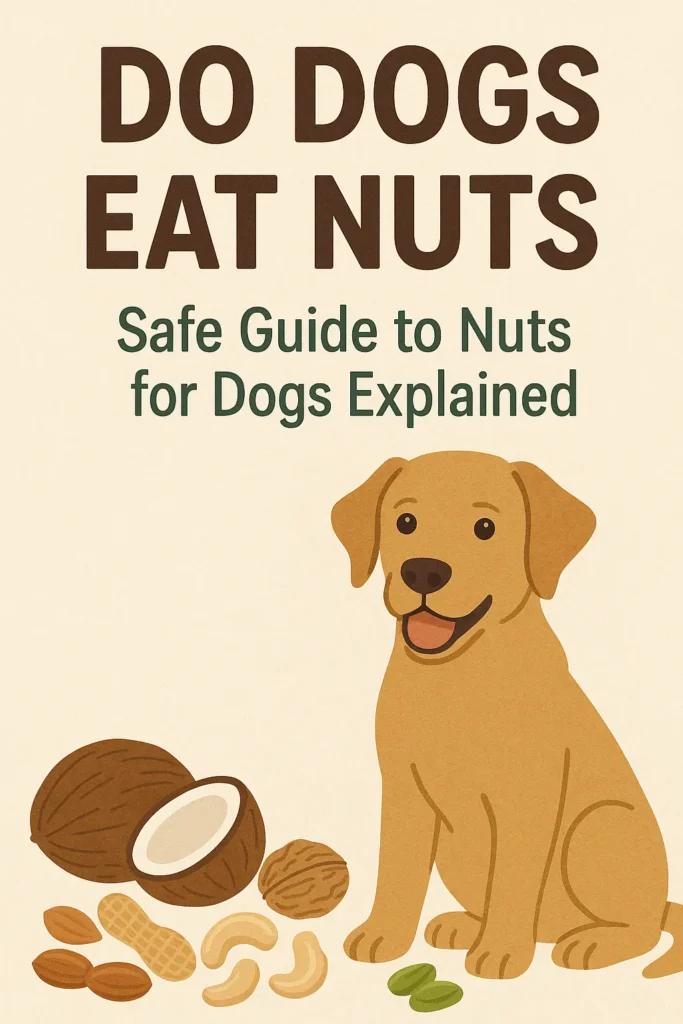Do dogs eat nuts? This question pops up when your pup gives you those pleading eyes as you snack on almonds for dogs. Dogs and nuts can mix safely, but some nuts can make them very sick or even cause death. A healthy snack can become a hazard if it is not chosen and served carefully.
This guide shows you which nuts are safe treats and which ones to keep far from your furry friend. Your dog’s health matters, so read on for clear advice.

Can Dogs Eat Nuts?

Dogs can eat some nuts, but not all. Nuts contain fats that may upset a pup’s tummy or lead to weight gain if too many are served. A small portion is key. Don’t forget to adjust serving sizes based on your dog’s size and calorie need.
For example, one or two candy-sized pieces work well for a smaller dog, while larger dogs may tolerate a few extra morsels.
Peanuts, though classified as legumes, remain mostly safe for dogs in small amounts. They offer a nutty, nutritious treat when prepared plainly. It is best to skip salted nuts, flavored nuts, or chocolate-covered varieties since these bring extra risks.
A dog’s diet is like a puzzle – each piece matters, but some pieces don’t fit at all.
Nuts That Are Safe for Dogs
Several nuts serve as safe treats when given sparingly. Many pet owners find them an enjoyable part of a balanced diet. Here are a few options that usually work well without an urgent vet visit.
Flesch-Kincaid Grade Level: 6.0
Peanuts
Peanuts rank as one of the safer options for dogs and nuts. They pack protein and healthy fats that help brighten a dog’s coat. Use plain, unsalted peanuts as an occasional treat. For small pups, one or two peanuts at a time work well.
Select raw peanuts or dry-roasted peanuts free of salt, sugar, or extra flavors. If you use peanut butter, pick a xylitol-free kind; note that natural peanut butter may have 190 calories per 2-tbsp serving.
Cashews
Cashews are another safe nut. They provide good fats and protein that can boost coat health. Plain, unsalted cashews are best since salt can harm dogs. Choose raw cashews rather than roasted ones with added flavors. Breaking them into small bits minimizes choking hazards.
Start with one or two pieces to see how your pet reacts. Roasting may lower aflatoxin risks, and these nuts also offer magnesium (82mg per ounce) to support nerve function.
Chestnuts
Chestnuts stand out as one of the few nuts dogs can enjoy safely. They contain less fat and carry a lower risk of causing pancreatitis in dogs. Dogs may munch on plain, cooked chestnuts as an occasional treat.
Always remove the hard outer shell and serve them cooked; raw chestnuts might upset your dog’s tummy. Offer only a few at first to check for allergies or gastrointestinal upset.
A dog with a chestnut is like a kid with candy – happy but needs limits!
Portion control for chestnuts is important. Overfeeding can lead to extra pounds or minor digestive issues. Serve modest portions and keep an eye on your pet’s reaction.
Nuts That Are Dangerous for Dogs
Not all nuts are safe. Some may trigger tremors, fever, or worse. Nuts such as macadamias carry high risks. They are known to cause severe problems in dogs. Moreover, walnuts and pecans can host harmful mold that releases toxins, sometimes including tremorgenic mycotoxins, which add extra danger.
Macadamia Nuts
Macadamia nuts top the danger list for dogs and nuts. They can create major problems within 12 hours, with symptoms like weakness in the back legs, vomiting, fever, and tremors. Even a small amount—as few as six nuts—can make your dog very sick.
The toxic element in macadamias is not clear, yet its effects are severe. If your dog eats macadamia nuts, contact your vet immediately. The ASPCA Animal Poison Control Center can help, and mixing macadamias with chocolate can heighten the risk.
Keep macadamias stored in secure spots where curious paws cannot reach them.
Walnuts
Walnuts present serious risks to your pet. They can harbor harmful mold that produces dangerous toxins. Mold on walnuts can produce tremorgenic mycotoxins that are linked to seizures. Black walnuts, in particular, can trigger muscle tremors, fever, and seizures.
English walnuts might seem milder, yet their high fat content can cause digestive issues and may trigger pancreatitis. Many store-bought walnuts have added salt and spices, which heighten the risks.
Pecans
Pecans carry a toxin that can make dogs very sick. They may cause upset stomachs, vomiting, and even seizures. Their high fat content might lead to pancreatitis, and the shells can injure a dog’s mouth or block the gut.
Never offer pecan pie or cookies containing pecans to your pet, even in small amounts.
Tips for Safely Feeding Nuts to Dogs
- Always remove shells before giving nuts to your dog. Shells can cause choking or block their gut.
- Skip salt and extra flavors when picking nuts for your pup. Plain, unsalted peanuts remain the safest option.
- Start with a tiny amount to see if your dog shows any bad reaction. Some dogs may have upset tummies even with safe nuts.
- Chop or crush the nuts into small pieces to lower the risk of choking, especially for dogs that eat quickly.
- Mix a few nuts with regular dog food rather than serving them alone. This can ease digestion.
- Store nuts in cool, dry spots to keep them from becoming moldy. Moldy nuts can make your dog very sick.
- Talk to your vet before adding nuts to your dog’s meals to get advice on proper amounts and frequency.
- Keep track of how many nuts you offer. Too many might lead to weight gain and other issues.
- Watch for signs like vomiting or odd behavior after eating nuts. Contact your vet if symptoms appear.
- Never serve macadamia nuts or walnuts, as these are toxic nuts for dogs and can cause serious harm.
Detailed Nutritional Information for Nuts
Nutrients in nuts play a role in canine nutrition. For example, unsalted peanuts offer protein and healthy fats that may improve a dog’s coat, though their high fat content can lead to weight gain or pancreatitis if overfed.
Plain cashews give protein and good fats, while chestnuts provide vitamin E and fiber to support overall health. Balancing these treats with your dog’s regular meals is key to keeping their tummy happy.
| Nut Type | Calories/Oz | Fat (g) | Protein (g) | Key Risks |
| Peanuts | 160 | 14 | 7 | Aflatoxins, pancreatitis |
| Cashews | 157 | 12 | 5 | High sodium if salted |
| Macadamia | 204 | 21 | 2 | Neurotoxicity |
| Walnuts | 185 | 18 | 4 | Juglone, mold |
Additional Nut Safety Considerations
Many nuts are high in fat, and even those that seem safe can cause tummy trouble. For instance, peanuts and cashews contain fat levels between 40-60% by weight. Such high fat can upset a dog’s stomach and may lead to pancreatitis. Also, storing nuts in damp conditions may let mold grow.
Some nuts pose extra risks because of their shape and digestibility. Almonds, for example, can be a choking hazard because of their shape and might block the gut due to poor digestibility. It is best to avoid almonds with dogs and to watch for any tummy upset if a new treat is given.
Further Considerations on Nut Toxicity
Macadamia nuts affect dogs in a special way. In tests, these nuts show no toxic effects in cats or people. One study revealed that a dose of 20g/kg can cause temporary paralysis in dogs.
Nut safety can change with where you live. For example, nuts grown in humid areas such as the southeastern U.S. may have up to three times the level of mycotoxins compared with those from drier regions.
Conclusion
Nuts can be a tricky treat for our furry pals. Safe options like peanuts, cashews, and chestnuts work well when given in small amounts. Yet, nuts like macadamia nuts can make your dog very sick. Always avoid salt, butter, and flavored varieties when sharing nuts with your pet.
Watch your dog closely when you introduce a new treat. If you notice any unusual symptoms, contact your vet without delay. Each snack should fit into your dog’s overall nutritional balance and help stop tummy upset or stomach irritation.
Your dog’s wellbeing matters most. Choose safe treats and keep dangerous nuts out of reach.
Frequently Asked Questions
- Can dogs eat nuts safely? Yes, dogs can eat some nuts in small amounts. Use plain, unsalted peanuts, cashews, or cooked chestnuts as dog treats. Keep portions tiny to avoid stomach problems.
- What should be done if a dog eats a toxic nut? If a dog eats macadamia nuts or unsafe walnuts, call your vet or the ASPCA Animal Poison Control Center immediately. Early help can ease the crisis.
- How can I tell if a nut treat is safe? Check that the nut or peanut butter is natural with no added salt, sugars, or flavors. Watch for any signs of an upset tummy or other issues.
Disclaimer: This content is informational and is not a substitute for professional veterinary care. DoDogsEat.com was created to help dog owners find clear answers on which foods are safe to share with dogs. Our information comes from veterinarians, animal nutritionists, and scientific articles.
Author & Research Disclosure: This guide was written by a veterinarian with 15 years of experience in veterinary medicine and pet nutrition. Our team reviewed scientific articles, consulted resources from a respected veterinary college, and used telemedicine insights to shape this advice







